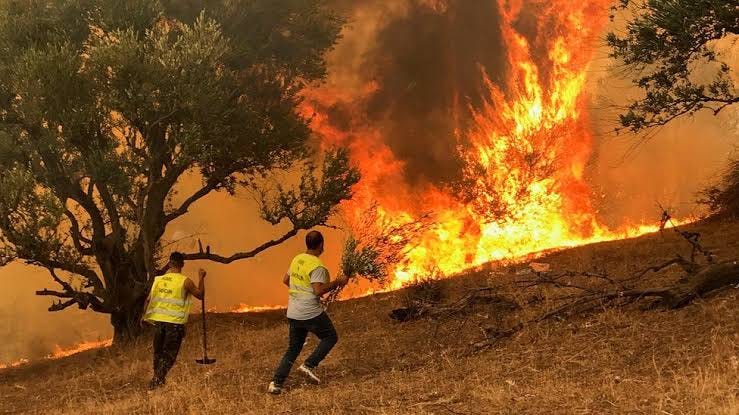How Africa serves as a Barometer to Gauge Europe, North America’s Heat Waves
Heat waves swept through Europe and North America since last week. Here are the deeper implications. Read to find out.
Heat wave-induced wildfire in Algeria, Credit, BBC.
On July 5, the African continent recorded its hottest reliably measured temperature. The incident took place at Ouargla in the Algerian Sahara Desert. The incident means a temperature of 51.3C, making officials to run around in a city with a population of 190,000. The occurrence means that Algeria faces the risk of greater heat waves, faces the risk of potential crop failures, faces the risk of migration as the climate change crisis continues. The occurrence means the possibility in the near future of a rapid transition in land, rapid transition in energy, rapid transition in cities.
On July 13, Tunisia took its turn at breaking a heat record. Its temperature reached 48 degrees Celsius in the capital city of Tunis. The temperature broke a 40-year record, with the heat wave accompanied by flames. The temperature fueled fires that damaged Tunisia’s grain crops, putting officials on their toes, as they struggled to contain the ensuing chaos in the land.
Heat waves in Cape Town, Credit, The South African
In many parts of Africa, lots of people struggle to contain the frequency of heat waves. In January, Cape Town took its turn at breaking a temperature record. In 2021, the average temperature for Africa hovered around 1.2 degrees Celsius above the 1981-2020 average, with nations within 15 degrees of the equator projected to endure a rise in the amount of heat waves.
Does Africa Matter in this debate
The heat waves in Africa matter. They matter because Africa accounts for the highest temperatures on the planet, thereby serving as a barometer to gauge the consequences of heat waves in a rapidly changing world. They matter because the continent shows first the effects of intense heat waves, so its situation foreshadows the future of others destined to experience a similar amount of temperature. They matter because the temperature records in the continent show that the planet heads towards an unacceptable rate of warming, with profound ramifications for the rest of the world.
They matter for another reason. A map showed the surface air temperatures across most of the Eastern hemisphere as of July 13, 2022. It showed Tunisia recording its highest temperatures, including the figure for countries such as Portugal and parts of France. It convinced experts that emissions of greenhouse gases from the industrialized world cause the latest heat waves, putting Africa on the brink of further droughts, further heat waves, and further crop failures.
Heat waves sweep across the United States, Credit, CBS News
The Devil Behind the Heat
In other words, the emissions of greenhouse gases come from European manufacturing concerns. They come from Asia, where China now occupies a position as the world’s greatest polluter. They come through the exploration of fossil fuel in North America, which must look at Africa as a barometer to gauge the range of consequences from heat waves open to her if she continues.
Already, Europe and North America head towards Africa’s predicament in relation to the range of consequences from heat waves. The U.S. puts 125 million people under heat alerts last week as record temperatures plagued cities in its south-west. Officials told 100 million Americans to stay indoors over the record-breaking heat, with the climate crisis projected to bring more high temperatures. Officials warned more than a third of the U.S. population over a potential lethal combination of extreme heat and humidity, as the heat waves stretched from parts of the Gulf Coast to the Great Lakes in the Midwest, with record temperatures set in the south-west.
Fighting wildfire in Portugal, Credit, NPR.
In Europe, a heat wave pushed temperature to the mid-40 Celsius in some regions. The heat waves triggered wildfires across Spain, while Britain recorded its highest temperature at 40.3C in the east of England this week. The heat wave pushed temperatures to 45C on July 13 in Leiria, Portugal, where more than 3,000 hectares got burnt by flames, the fires putting more than half of the country on a red alert. The heat wave descended on France, as temperatures climbed above 40C in some parts of the country, intensifying an already severe drought, forcing fires to rage, breaking many long-standing temperature records.
If Europe refuses to cut its emissions of greenhouse gases, many more long-standing temperature records stand to be broken. Further fires stand to rage in Portugal and Spain, while the temperature recorded in the east of England becomes a child’s play, with other European nations at the risk of having their firefighters battling multitude flames at the same time. Even more temperature records stand to be broken in the south-west of the United States, with more than a third of the country’s population on the verge of living through red alerts over the climate change-induced condition, mirroring the challenge many parts of Africa presently experience.
The Way Forwards
Therefore, nations in North America need to cut down their emissions of greenhouse gases. The same thing needs to be done in Europe, to prevent heat waves from overwhelming its health and care systems. Though Africa spews far less greenhouse gases into the atmosphere, it needs to cut down too on what it does, to halt the environmental devastation in places such as Somalia and the coastal areas of Nigeria.
Protests need to come into play. Protests by civil society groups need to take place on the global space, aimed at reducing the rate politicians support fossil fuel companies. Protests by scientists need to be held, to create an awareness of the weather extremes from emissions of greenhouse gases.
Protests by the general society force a rethink in official circles, since they show widespread discontent over the climate change-induced heat waves, over the terrible impacts of temperature increase on people and infrastructure, over the potential lethal consequence of a combination of extreme heat and humidity currently settling in affected nations.
Through such activities, nations could turn away from greenhouse gas emissions. They not only turn away from it, they could steer the world away from a path of unacceptable warnings with serious implications for all nations. They not only mitigate the serious droughts in parts of Africa, they could also halt the North American and Europe’s situation from deteriorating into the African situation, which suffers from the hottest temperature figures on earth.
What you can do against the heat
So many documents exist on preparations against heat waves. Here is one of them from NSW Health
As summer hits, you need to stay cool through the rising heat. Inverse gives you ways to achieve this objective.
Illness occurs during periods of heat waves. To prevent them from escalating, this Insider article presents six ways to get over the problem.
Sometimes, the heat hits extreme levels, meaning extreme measures become necessary to cope with the heat raging through the land. Almanac gives ten tips to cope with extreme heat and ensure safety.
Heat waves around the world
Exceptional heat causes wildfires and heat waves around the globe. Here's a selection of newspaper front pages from the last few days. You can view them here.
What to eat
Vegan Algerian couscous, Credit, EloraM23








